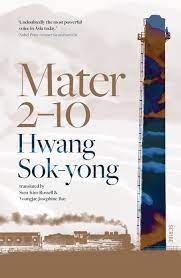
How many novels have been written about Korea, communism, and trade unions? Few, if any. This award-winning novel by HSY is a revelation to many of us in the west who, like me, might be trade unionists, have worked alongside communists in the labour movement but know very little about the history of Korea and its place in the global labour movement.
HSY is an activist and socialist. He has been imprisoned in South Korea for his political activities and his novel is both personal and political. It is an important novel because it gives the rest of the world an insight into the history of the ordinary Korean and their fight for an independent and democratic country.
The novel begins in modern day Seoul as Jino is staging a sit in at the top of a chimney on a power plant standing 45 metres high. He is in his mid-50s and has worked in factories for 25 years. His protest is to get his and the other union members jobs back. His company, like many others regularly shut their factories down and sell it off to other companies. But he, and his comrades have refused to accept this and now at the company’s headquarters in Seoul they are fighting to get their jobs back.
Hwang takes us back through the history of Korea and the lives of the working class as they live through Japanese colonial rule. As he recounts in 1910 “the country was officially swallowed whole by Japan.”
The consequences for working class Koreans are dire as they struggle to find work and make a living. Japanese domination is reflected in the way they build a railway line through the country; devastating villages, forcing Koreans to build the track and killing and raping any protestors.
But Japan faces opposition from an Independence Movement and a Joseon Communist Party which was set up in 1925. Koreans took part in labour and agrarian disputes all over the country and hand to hand fighting in the border areas of Joseon and China.
Hwang weaves the history of Korean resistance through a series of characters. He shows how women play an important role in the labour movement. Many women work in the textile factories, learn about communism through book clubs but are radicalised by their slave working conditions. They were the lucky ones as many Korean women end up in forced labour or in brothels.
This resistance has a price and Hwang details not just the brutal response of the Japanese to labour activists (women and men) but also the way that Koreans are used to inform on their comrades.
I have to keep reminding myself that this is a novel but Hwang insists on educating the reader on the real lives of Koreans over a century of struggle for a united country. His aim is to fill a gap in Korean literature and put industrial workers centre stage.
His novel is also unique, unlike many western novels, he puts socialism as at the centre of the labour movement during Japanese colonialism and afterwards. There is a great deal of hope in this book and Hwang believes in a better future. “Whether this period of suffering will be short or long is entirely up to the efforts of those of us living in the present. The traces of our lives and the time we lived in may be no more than a few specks of dust compared to the life of the vast universe. And though change happens slowly – very, very slowly – I don’t want to abandon my hope that it changes for the better.”
If you live in Greater Manchester you can borrow it from our wonderful public libraries. Or buy it from News from Nowhere here.
I
“
Thank you.
Sent from my iPad
<
div dir=”ltr”>
<
blockquote type=”cite”>